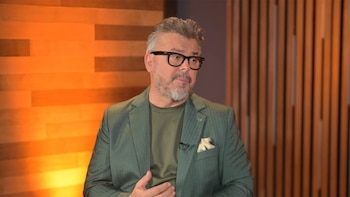
John Rodda in 1987 during an IOC Press Commission visit to Calgary.British journalist John Rodda, considered one of the best reporters on the Olympics beat for more than 30 years, died Monday at his home in Taunton in west England. He had suffered from a long illness.
The 1948 Olympics in London were the first Games he covered – an 18-year-old at the time. He covered cycling events for the South London Press.
In 1950 he joined the Manchester Guardian and in 1960 he began an unbroken string of Olympics coverage for the newspaper that ended in 1994, a year before he retired.
Colleague and friend Morley Myers tells Around the Rings Rodda was close to IOC President Lord Killanin, himself a former journalist. Killanin established the IOC Press Commission during his term from 1972 to 1980, installing Rodda as one of the charter members of the commission.
Myers, who served with Rodda on the press commission, recalled that his colleague had an encyclopedic knowledge of IOC rules and regulations. Myers says that Rodda would use his know-how to knock back media arrangements for the Games that weren’t up to standards.
In 1968 while reporting, Rodda had to duck gunfire when police crushed rioting in Mexico City prior to the Games. His dispatches were the first to report a death toll into the hundreds from the clashes, contradicting official reports that claimed only three dozen fatalities.
Four years later in Munich, Rodda again found himself in the midst of trouble, at the media accommodation for the 1972 Games located next to the Olympic Village that had come under siege by Palestinian terrorists. Rodda put on a track suit as a way to help gain access to the village to report on the attack.
In addition to his Olympics work, Rodda also covered boxing, including the fabled 1974 bout in Zaire between Muhammad Ali and George Foreman, the “Rumble in the Jungle."
Along with his newspaper writing, Rodda co-authored three Olympic histories with Killanin and the autobiography of runner Steve Ovett.
“I just remember, when we were working on the book, he would look over his reading glasses at me and chuckle at the rubbish I was coming up with,” Ovett recalls of Rodda.
London 2012 chairman Sebastian Coe, whom Rodda covered when Coe was a world-class miler, expressed regrets that Rodda would not see the 2012 Olympics.
“The Rodda liked to have fun, seen here making the most of a dinner in Budapest with press colleagues in 1995. (ATR)thing about John was that he absolutely loved athletics,” Coe is quoted in The Guardian.
“We also shared a love of boxing – he was a great boxing writer too – and we shared many great conversations about the two sports.”
Coe says Rodda also provided some key advice to London in the early stages of the 2012 bid.
“Every IOC member should be told between now and the vote: ‘The Queen will hold a banquet at Buckingham Palace for the IOC just before the Games begin. No she will not be on holiday and yes the government has arranged it.’ Be clear about a couple of points: the IOC is still a private self-perpetuating club and though bribery is out, persuasion is not.”
John Clinton Rodda was born in Kent, Nov. 6, 1930.
He is survived by his wife, Yveline, their daughter, Lucy, five children from his first marriage, 11 grandchildren and three great-grandchildren.
Written by Ed Hula.
For general comments or questions,
Últimas Noticias
Sinner-Alcaraz, the duel that came to succeed the three phenomenons
Table tennis: Brazil’s Bruna Costa Alexandre will be Olympic and Paralympic in Paris 2024

Rugby 7s: the best player of 2023 would only play the medal match in Paris

Rhonex Kipruto, owner of the world record for the 10000 meters on the road, was suspended for six years

Katie Ledecky spoke about doping Chinese swimmers: “It’s difficult to go to Paris knowing that we’re going to compete with some of these athletes”



